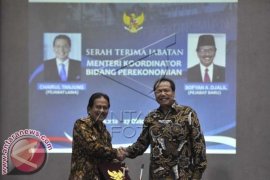Jakarta (Antara Bali) - Realization of infrastructure projects under the Masterplan for Acceleration and Expansion of Indonesian Economic Development (MP3EI) can boost equitable, sustainable, and balanced economic growth across the country, stated Coordinating Minister for Economic Affairs Chairul Tanjung.
"By intensifying economic growth in every province, district, and city without exception, the competitiveness in facing the global economy will increase," Tanjung stated while addressing a conference on "Reflection of Three Years of MP3EI Implementation," here on Friday.
President Susilo Bambang Yudhoyono, Vice President Boediono, and several ministers attended the conference.
The MP3EI is expected to promote the development of new economic growth centers in provinces, districts, and cities.
The new economic growth centers will be provided facilities such as infrastructure and connectivity to support and synergize economic activities in regions.
The infrastructure projects will facilitate land and air connectivity to promote equitable growth in every region.
By implementing transformative development, Indonesia is expected to become an advanced nation and a new world economic power with a per capita income of over US$15 thousand.
"In the future, Indonesia should be able to become one of the seven strong economic nations by 2045, or coinciding with the Centennial celebrations of our Independence," he stated.
He pointed out that during the period between May 27, 2011, and June 2014, 383 MP3EI projects worth Rp863.3 trillion had been realized in the six economic corridors that cover Sumatra, Java, Kalimantan, Sulawesi, Bali-Nusa Tenggara, and Papua-Maluku.
Of the total projects, 174 were in the real sector with a total investment of Rp441 trillion, and 209 infrastructure projects with an investment amounting to Rp422 trillion.
Sources of funding for the MP3EI projects were state enterprises accounting for 26.2 percent of the total funds, the private sector 37.9 percent, the government 15.6 percent, and the government and the private sector 20.1 percent. (WDY)



